
RUSSIAN JOURNAL OF ECOLOGY
metrics 2024
Bridging Research and Practice in Russian Ecology
Introduction
RUSSIAN JOURNAL OF ECOLOGY, published by PLEIADES PUBLISHING INC, stands as a critical resource within the field of ecology, offering an array of research insights that span various ecological topics. With an ISSN of 1067-4136 and an E-ISSN of 1608-3334, this journal has been consistently disseminating knowledge since its inception in 1996, now converging towards 2024. Despite its current Q4 ranking in the Ecology, Evolution, Behavior and Systematics category, the journal has carved out a niche in the publication landscape, particularly for scholars focused on the rich and diverse ecological phenomena of Russia and surrounding territories. The journal aims to foster interdisciplinary collaboration and innovation by providing a platform for the dissemination of high-quality research. While it currently lacks open access options, readers can expect in-depth studies and analytical discourses that contribute meaningfully to the global understanding of ecological systems. With an impressive Scopus rank, this journal remains an important outlet for researchers, professionals, and students committed to advancing ecological science.
Metrics 2024
 0.25
0.25 1.00
1.00 0.80
0.80 29
29Metrics History
Rank 2024
Scopus
IF (Web Of Science)
JCI (Web Of Science)
Quartile History
Similar Journals
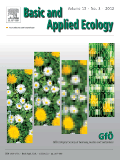
BASIC AND APPLIED ECOLOGY
Bridging theory and practice in the realm of ecology.BASIC AND APPLIED ECOLOGY, published by Elsevier GmbH in Germany, stands out as a premier journal in the field of ecology, evolution, behavior, and systematics. With its ISSN 1439-1791 and E-ISSN 1618-0089, the journal enjoys a distinguished reputation, evidenced by its classification in the Q1 category for Ecology in 2023 and impressively ranking #89 out of 721 in this domain according to Scopus. Since its inception in 2000, it has served as a vital platform for disseminating high-quality research that bridges theoretical insights and practical applications in ecology. Researchers, professionals, and students alike can look forward to the latest findings that not only foster a deeper understanding of ecological processes but also inform sustainable practices crucial for our environment. As the journal continues its journey through to 2024, it remains committed to advancing ecological knowledge and supporting innovative research in an ever-evolving field.

Insect Conservation and Diversity
Unraveling the Mysteries of Insect BiodiversityInsect Conservation and Diversity is an esteemed academic journal dedicated to the field of insect science, published by WILEY in the United Kingdom. With its ISSN 1752-458X and E-ISSN 1752-4598, this journal serves as a vital resource for researchers and professionals striving to advance knowledge in biodiversity and conservation. The journal holds an impressive Q1 ranking in both Ecology, Evolution, Behavior and Systematics and Insect Science as of 2023, which reflects its rigorous peer-review process and significant contributions to the field. Recognized for its high-quality publications, Insect Conservation and Diversity ranks 9th out of 181 in insect science and 72nd out of 721 in ecology within Scopus, placing it in the top tiers of academic journals. Researchers are encouraged to submit their work from 2009 to 2024, enhancing our understanding of insect biodiversity and conservation strategies. Aimed at fostering advancements in knowledge and collaborative efforts, this journal is essential for all those committed to the study and preservation of insect diversity.
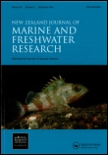
NEW ZEALAND JOURNAL OF MARINE AND FRESHWATER RESEARCH
Championing Ecological Research for Tomorrow's ChallengesNEW ZEALAND JOURNAL OF MARINE AND FRESHWATER RESEARCH, published by Taylor & Francis Ltd, stands as a distinguished platform for the dissemination of innovative research in the realms of aquatic science and ecology. With an ISSN of 0028-8330 and E-ISSN 1175-8805, this journal has been curating significant scientific contributions since its inception in 1967, continuing through to 2024. Recognized in the Q2 category across multiple relevant fields—including Aquatic Science, Ecology, and Water Science—this journal ranks notably in Scopus, with a 74th percentile for Ecology, Evolution, Behavior and Systematics, highlighting its impact and relevance within the scientific community. Though not an open-access publication, its rigorous peer-reviewed articles offer insights that resonate with researchers, professionals, and students who are passionate about advancing our understanding of freshwater and marine ecosystems. By fostering a collaborative space for ecological and environmental inquiries, the NEW ZEALAND JOURNAL OF MARINE AND FRESHWATER RESEARCH is essential for those aiming to contribute to the vital conversations around biodiversity, conservation, and sustainable management of aquatic resources.
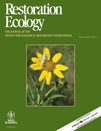
RESTORATION ECOLOGY
Empowering Restoration through Innovative ResearchRESTORATION ECOLOGY is a leading international journal dedicated to the science and practice of ecological restoration, published by WILEY. With an ISSN of 1061-2971 and a robust E-ISSN of 1526-100X, this journal has successfully positioned itself within the top quartiles (Q1) in significant categories such as Ecology, Evolution, Behavior and Systematics, and Nature and Landscape Conservation, showcasing its high-impact contributions to these vital fields. RESTORATION ECOLOGY has been actively disseminating critical research since 1993 and continues to thrive as it converges toward 2024. Ranked impressively within Scopus, it stands at #98 out of 721 in Agricultural and Biological Sciences and #30 out of 211 in Environmental Science, emphasizing its substantial influence and reach. While the journal operates under traditional access guidelines, it serves as an invaluable resource for researchers, professionals, and students alike, aiming to advance knowledge and practical solutions for biodiversity conservation and ecosystem rehabilitation globally. For those interested in the intersection of ecological theory and practical restoration applications, RESTORATION ECOLOGY is a key outlet for fostering dialogue and collaboration.

ACTA OECOLOGICA-INTERNATIONAL JOURNAL OF ECOLOGY
Advancing Sustainability through Cutting-Edge ResearchACTA OECOLOGICA-INTERNATIONAL JOURNAL OF ECOLOGY, published by Elsevier, stands as a prominent platform for disseminating innovative research in the diverse field of ecology. Operating since 1983 and continuing to make significant contributions into 2024, this journal features critical studies that advance our understanding of ecological systems, behaviors, and conservation efforts. With an impressive Q2 ranking in both the ecology and nature conservation categories, it exemplifies high-quality scholarship, reflected in its Scopus rankings—#74 in Environmental Science and #254 in Agricultural and Biological Sciences. Researchers, professionals, and students in the field are invited to explore the latest findings and methodologies that address pivotal ecological issues. As a journal committed to fostering academic collaboration, ACTA OECOLOGICA is essential for anyone dedicated to enhancing their comprehension of ecological dynamics and advancing sustainability practices globally.

Neotropical Biodiversity
Connecting global minds through Neotropical ecological research.Neotropical Biodiversity is a prominent journal dedicated to advancing our understanding of biodiversity and ecological dynamics within the Neotropical region. Published by TAYLOR & FRANCIS LTD in the United Kingdom, this Open Access journal has been providing unrestricted access to research findings since 2015, fostering collaboration and knowledge sharing among the global scientific community. With an emphasis on innovative research in Ecology, Ecology, Evolution, Behavior and Systematics, and Global and Planetary Change, it has earned a reputation for excellence, currently holding a Q3 category in its field. As of 2023, the journal ranks in the 37th percentile for Environmental Science (Ecology) and in the 36th percentile for Agricultural and Biological Sciences (Ecology, Evolution, Behavior and Systematics), making it a valuable resource for researchers, professionals, and students interested in understanding and preserving biodiversity in one of the world's most diverse ecosystems. We invite you to explore the cutting-edge research published in Neotropical Biodiversity and contribute to the ongoing dialogue for environmental sustainability and ecological resilience.
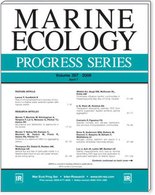
MARINE ECOLOGY PROGRESS SERIES
Navigating the future of aquatic ecology.MARINE ECOLOGY PROGRESS SERIES, published by INTER-RESEARCH in Germany, is a premier journal dedicated to advancing the field of marine ecology. Renowned for its rigorous peer-review process and high-quality publications, it holds a Q1 ranking in various categories including Aquatic Science and Ecology according to the 2023 category quartiles. With an impressive Scopus ranking, the journal is positioned in the 80th percentile within the Ecology, Evolution, Behavior and Systematics field, attesting to its significant impact in marine research. Covering a broad scope from basic ecological research to applied marine science, MARINE ECOLOGY PROGRESS SERIES aims to facilitate scientific exchange and promote the understanding of marine ecosystems. Researchers and professionals looking to stay abreast of the latest developments and findings in marine ecology will find this journal indispensable for enhancing their knowledge and contributing to ongoing discussions in the field.
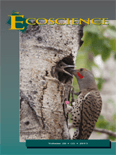
ECOSCIENCE
Elevating discussions on biodiversity and environmental practices.ECOSCIENCE, published by Taylor & Francis Inc, stands as a prominent journal in the fields of Ecology and Environmental Science, recognized for its commitment to advancing knowledge since its inception in 1994. With an ISSN of 1195-6860 and an E-ISSN of 2376-7626, the journal caters to a diverse audience of researchers, professionals, and students passionate about ecological and environmental issues. In 2023, it achieved Q2 and Q3 rankings in the Scopus category of Ecology and Evolution, Behavior and Systematics, reflecting its significance within the academic community. Moreover, ECOSCIENCE occupies notable positions in Scopus rankings, including Rank #324 in Agricultural and Biological Sciences and Rank #210 in Environmental Science, symbolizing its role as a catalyst for disseminating high-quality research. Although currently not open access, the journal's multifaceted scope encourages in-depth discussions on ecological diversity, conservation strategies, and sustainable practices, making it an invaluable resource for those engaged in ecological research and practice.

OIKOS
Unveiling the complexities of ecology and evolutionary science.OIKOS is a leading journal dedicated to the field of Ecology, Evolution, Behavior, and Systematics, published by WILEY in the United Kingdom. Since its inception in 1973, OIKOS has established itself as a vital platform for researchers seeking to advance their understanding of ecological interactions and evolutionary processes, with its impact reflected in its prestigious Q1 classification in the 2023 Scopus rankings. The journal's dedication to high-quality research is exemplified by its robust ranking of #106 out of 721 in the relevant categories, situating it within the top 15% of journals globally. With a commitment to disseminating influential findings, OIKOS encourages the open exchange of ideas among a diverse range of scholars, making it an essential resource for academics, professionals, and students alike. Whether you are interested in innovative ecological theories or applied research with real-world implications, OIKOS provides a rich repository of knowledge to inform and inspire your work.

Global Ecology and Conservation
Unlocking insights for a thriving planet.Global Ecology and Conservation, published by Elsevier, stands as a premier open-access journal dedicated to advancing the field of ecology and conservation science. Since its inception in 2014, the journal has facilitated the dissemination of high-quality research, fostering critical dialogue on ecosystem management, biodiversity preservation, and sustainability practices across the globe. With a remarkable ranking within the top quartiles (Q1) in various categories including Ecology, Evolution, Behavior and Systematics, and Nature and Landscape Conservation, it is positioned among the leading resources for researchers and professionals alike. The journal has garnered a notable impact, ranking #65 out of 721 in Ecology, and houses articles that are vital to understanding and addressing the pressing environmental challenges of our time. Available in an open-access format, researchers can freely access and share vital findings, promoting a collaborative approach to ecological research. Global Ecology and Conservation is not just a publication; it is a critical tool for innovation and advocacy in conservation, poised to inspire the next generation of environmental stewards.